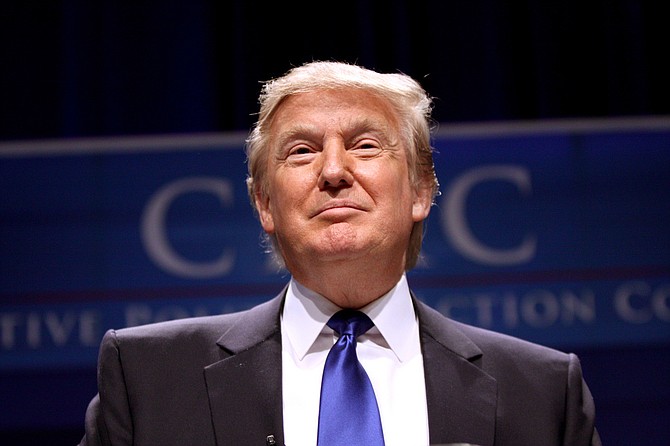President Donald Trump on Friday insisted "trade wars are good, and easy to win," a bold claim that prompted threats of retaliation against U.S. exports like blue jeans and motorcycles. Photo courtesy Flickr/Gage Skidmore
WASHINGTON (AP) — President Donald Trump on Friday insisted "trade wars are good, and easy to win," a bold claim that prompted threats of retaliation against U.S. exports like blue jeans and motorcycles.
"Make no mistake: If the president goes through with this, it will kill American jobs -- that's what every trade war ultimately does," said Sen. Ben Sasse, a Nebraska Republican.
Trump has declared that the U.S. will impose punishing tariffs on steel and aluminum imports. The move will likely raise steel and aluminum prices here. That's good for U.S. manufacturers. But it's bad for companies that use the metals, and it prompted red flags from industries ranging from tool and dye makers to beer distributors to manufacturers of air conditioners. The American International Automobile Dealers Association warned it would drive prices up "substantially."
Markets tumbled in Asia, where China expressed "grave concern," and the weakness spread to Europe, where the European Union promised retaliation against American exports if Trump follows through. In the United States, the S&P 500 dropped as much as 1.1 percent before paring its decline.
"None of this is reasonable, but reason is a sentiment that's very unevenly distributed in the world," said Jean-Claude Juncker, president of the EU's executive body.
Asked if a trade war is brewing, he said: "I can't see how this isn't part of war-like behavior."
Early Friday, Trump took to Twitter to defend himself: "When a country (USA) is losing many billions of dollars on trade with virtually every country it does business with, trade wars are good, and easy to win. Example, when we are down $100 billion with a certain country and they get cute, don't trade anymore-we win big. It's easy!"
He later tweeted: "Our steel industry is in bad shape. IF YOU DON'T HAVE STEEL, YOU DON'T HAVE A COUNTRY!"
Sen. Sasse echoed a sentiment of many U.S. lawmakers when he issued a statement in response: "Kooky 18th century protectionism will jack up prices on American families."
Trump's announcement came only after an intense internal White House debate. It brought harsh criticism from some Republicans and roiled financial markets with concerns about economic ramifications.
Trump has long railed against what he deems unfair trade practices by China and others. This week, he summoned steel and aluminum executives to the White House and declared he would levy penalties of 25 percent on imported steel and 10 percent on aluminum imports. The tariffs, he said, would remain for "a long period of time," but it was not immediately clear if certain trading partners would be exempt.
"This is going to have fallout on our downstream suppliers, particularly in the automotive, machinery and aircraft sectors," said Wendy Cutler, a former U.S. trade official who is now vice president of the Asia Society Policy Institute. "What benefits one industry can hurt another. What saves one job can jeopardize another."
Steel-consuming companies said steel tariffs imposed in 2002 by President George W. Bush ended up wiping out 200,000 U.S. jobs.
The decision had been strenuously debated within the White House, with top officials such as economic adviser Gary Cohn and Defense Secretary Jim Mattis raising concerns.
The penalties were pushed by Commerce Secretary Wilbur Ross and White House trade adviser Peter Navarro, an economist who has favored taking aggressive action.
Mattis, in a memo to Commerce, said U.S. military requirements for steel and aluminum represent about 3 percent of U.S. production and that the department was "concerned about the negative impact on our key allies" of any tariffs. He added that targeted tariffs would be preferable to global quotas or tariffs.
Plans for Trump to make an announcement were thrown into doubt for a time because of the internal divisions. The actual event caught some top White House officials off guard and left aides scrambling for details. Key Senate offices also did not receive advance notice.
White House press secretary Sarah Huckabee Sanders said the decision "shouldn't come as a surprise to anyone," noting that the president had been talking about it "for decades." On Friday, she told reporters that Trump wasn't concerned about the day's market decline, adding that the "president is still focused on long term economic fundamentals."
Sasse wasn't the only Republican in Congress who was plainly upset.
GOP Sen. Pat Roberts of Kansas, chairman of the Senate Agriculture Committee, said, "Every time you do this, you get a retaliation and agriculture is the No. 1 target." House Speaker Paul Ryan, R-Wis., said through a spokesman he hoped Trump would "consider the unintended consequences of this idea and look at other approaches before moving forward."
Trump met with more than a dozen executives, including representatives from U.S. Steel Corp., Arcelor Mittal, Nucor, JW Aluminum and Century Aluminum. The industry leaders urged Trump to act, saying they had been unfairly hurt by a glut of imports.
"We are not protectionist. We want a level playing field," said Dave Burritt, president and chief executive officer at U.S. Steel.
Copyright Associated Press. All rights reserved. This material may not be published, broadcast, rewritten, or redistributed.



Comments
Use the comment form below to begin a discussion about this content.